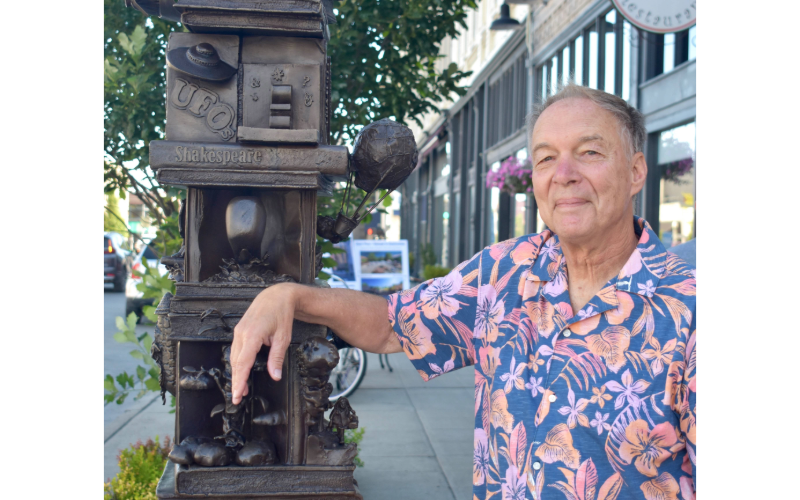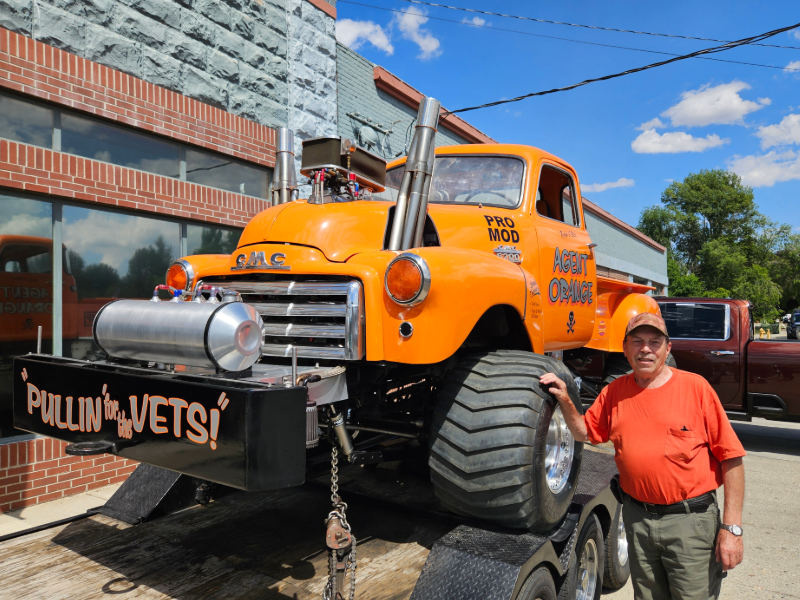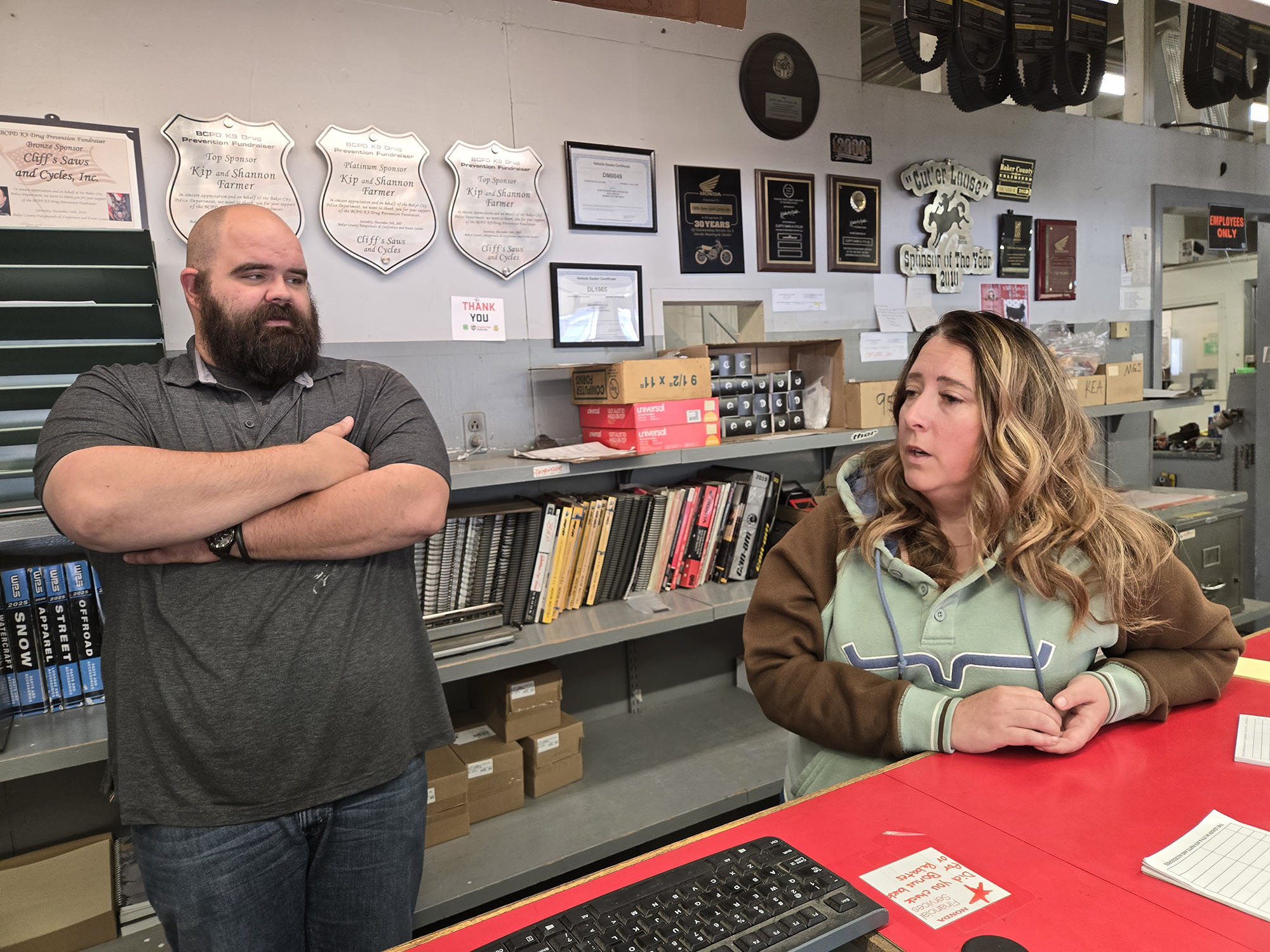A long military career leads to knighthood
Published 12:11 pm Monday, November 9, 2009
Eric Labonte doesn’t joust, wield a sword or sit at a round table,
Trending
but he has earned the right to be called Sir Eric Labonte after being
knighted for his years of military service.
After 12 years in the United States Marine Corps, and eight years in
Trending
the Oregon National Guard based in Baker City, Labonte, at 39, became
one of the youngest soldiers ever to be knighted when, in August, the
Order of Saint George was bestowed on him by the United States Armor
Association.
Labonte comes from a family with a history of military service, and that heritage played a role in his decision to enlist in the Marines in 1987.
“Miliary service is a family tradition,” he said. “My father had been in the Air Force for 30 years – 1961 to 1991.”
He said previous generations in his family also served in the military in World War II and other wars.
With his father, Dan Labonte, serving in the Air Force, Eric and his brother and other family members moved around a lot.
The family was living in Baker City when Eric attended high school his sophomore and junior years, but when his dad was transferred to Virginia before the start of his senior year, Eric went with the family and graduated from a high school in Virginia.
“In October 1987, my twin brother and I decided to join up. He enlisted in the Navy and I enlisted in the Marine Corps,” Labonte said.
They had just turned 17. Labonte said he was drawn to the Marine Corps because of the sense of pride of belonging and leadership.
“At 17, I wasn’t sure what I wanted to do with my life. I love my country. I felt like joining the military was good experience for a young guy,” Labonte said.
He liked the idea that he’d get specialized training in the military in
Continued from Page 2B
fields such as electronics, computers, welding and mechanics, engineering and many others that prepare people for careers in the private sector.
But once he was a member of the Marine Corps, Labonte said he felt like he’d found his niche and decided to make a career of military service.
“Once you are in, it’s a great bunch of people,” Labonte said.
Over his 20-year military career, Labonte rose to the rank of chief master sergeant – the same rank his father held in the Air Force, which is the highest rank an enlisted man can attain.
“All of our family have been enlisted men,” Labonte said. (His brother Alan started out as an enlisted man in the Navy but he was later selected to attend officer training school and attained the rank of lieutenant.)
Labonte was drawn to tanks, and over the years he became one of the Marine’s top tank instructors, which played a role in his being knighted.
Over the years, Labonte served in China, Japan, Korea, Iwo Jima, Europe and many other places, including, as a National Guardsman, more than a year in Iraq as a squad leader with the 116th Calvary out of Baker City.
“The 116th out of Baker City was mobilized in June 2004 and came back from Iraq in December 2005,” Labonte said. “I was the original squad leader for second platoon Alpha Company.
“We did combat patrols, provided escort security during the first national elections and helped train the Iraqi military and police,” he said.
His platoon was also among those assigned to clear IEDs (Improvised Explosive Devices) from major routes in Iraq.
“I was in a convoy where one of the other vehicles got hit with an IED. Luckily that wasn’t an everyday thing,” Labonte said.
During Iraq’s elections, Labonte’s platoon was among those clearing IEDs from routes the Iraqi people had to travel to get to the polls.
He said when they’d catch people who planted IEDs, the saboteurs often would say that they had nothing against the United States or its military, but had planted the bombs for money.
The going rate for planting an IED in the road in Iraq was reportedly $200, he said.
Labonte’s platoon was also involved in providing security for Iraqi girls who got their first chance to go to school after America overthrew Saddam Hussein’s regime.
Other missions included searching villages and conducting raids to root out terrorists.
One of the things Labonte noticed during his tour of duty in Iraq was a difference between the National Guard units, which included people mostly in their 20s who had careers back home as police officers, firemen, dentists, carpenters, electricians, engineers and many other professions.
By comparison, he said the average age of soldiers serving active duty branches of the military was about 19.
He said the National Guard units showed a higher level of maturity in how they handled things in Iraq, due largely to the difference in age and life experiences, as well as the fact that most National Guard members had families of their own at home waiting for them to return.
Like many of the soldiers who serve in Iraq, Labonte said the experience changed him.
“I remember when I came home my daughter said I was meaner,” Labonte said.
Between those changes and the year and a half he was away from home, he had trouble re-adjusting to married life, and as a result he said he and his wife are separated.
During much of his military career at home and abroad, Labonte was a tank crew evaluator and gunner training leader. He set up tank training ranges and ran simulators to train tank crews.
After his transition from active duty in the Marines to the National Guard in 1999, Labonte took some training classes in preparation for his transition to a civilian career with the Training and Employment Consortium.
“I was actually a dislocated worker when I got out of the Marine Corps,” Labonte said.
He said he was originally planning to go to work for the U.S. Border Patrol, but while he was taking classes for dislocated workers he was offered a job training dislocated workers and youth work crews, and he wound up liking it so well he dropped his plans to become a border patrol agent.
That was in July of 2000, and Labonte has been working as a trainer and manager for Workforce Investment Act programs ever since, providing training and work experience for youth crews, as well as adult dislocated workers, including former soldiers returning from tours of duty in Iraq and Afghanistan.
“We help dislocated workers get training so they can get back in the work force,” Labonte said.
He said he came to realize that what he liked best about his military service was helping people, whether it was by providing them security to go vote in elections, for construction crews building schools and hospitals and restoring other services, or helping train soldiers.
“A lot of the good we accomplished in Iraq never got much media coverage,” Labonte said. “We did a lot to help the people. It was more in the line of helping them become more self-sufficient.”
“I like helping people. At the Training Consortium, we deal with some people who are pretty low, and it feels good to help them get on the path to a better life,” Labonte said. “I like doing a job where you get a sense of accomplishment from helping people.”









